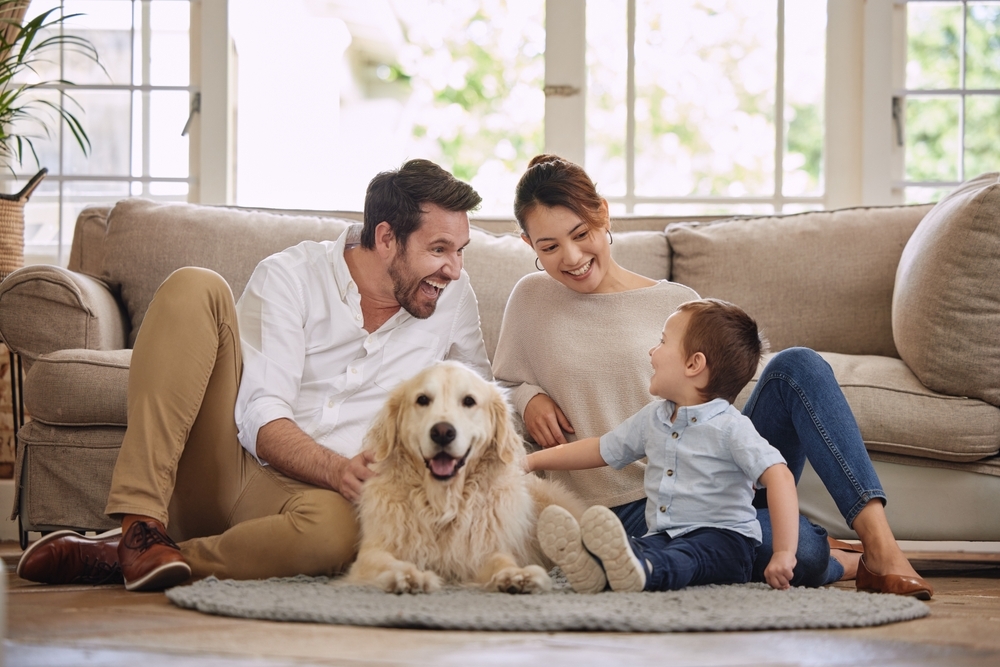
Last Updated:
February 20th, 2025
For many people in recovery, maintaining sobriety is an ongoing journey that requires continuous effort, self-care, and support. While traditional therapy, support groups, and lifestyle changes play crucial roles, an often overlooked source of strength in sobriety is the companionship of a pet. Whether it’s a loyal dog, a gentle cat, or even a small pet like a rabbit or bird, animals provide unwavering support that can significantly benefit those in addiction recovery.
We take a look at the ways in which pets can enrich your recovery journey and just how far unconditional love can take you.
The psychological and emotional benefits of pets in recovery
The unconditional love and responsibility associated with owning a pet can be crucial in supporting individuals recovering from addiction. Pets provide much-needed psychological and emotional support that can ease feelings of loneliness, reduce stress, and instill a renewed sense of purpose, all of which contribute to a more stable sense of well-being and can help people navigate the challenges of sobriety.
-
Companionship and emotional support
Loneliness is a common trigger for relapse, particularly as individuals distance themselves from toxic social circles associated with substance use. Pets offer unwavering companionship, filling the emotional void that may otherwise lead to cravings. Their presence provides a constant source of comfort, reminding those in recovery that they are not alone in their journey.
-
Reducing stress and anxiety
Recovery can be an emotionally intense process, with individuals facing past traumas and daily stressors. Scientific studies have shown that spending time with pets can lower cortisol levels, the stress hormone, while simultaneously boosting serotonin and dopamine, the feel-good chemicals in the brain. Activities like petting, playing, or simply being around an animal can create a calming effect, helping to ease anxiety and promote emotional stability.
-
Providing a sense of Purpose
Early sobriety often comes with an overwhelming sense of uncertainty as individuals work to rebuild their lives. Caring for a pet introduces structure and responsibility, encouraging routine and commitment. Knowing that a pet depends on them for food, exercise, and companionship gives individuals a tangible reason to stay accountable and embrace their new sober lifestyle.

The physical benefits of pets in sobriety
Pets play a powerful role in supporting sobriety, offering not only emotional companionship but also significant physical benefits. Through various physical benefits, pets can become invaluable partners in the journey to lasting sobriety.
-
Encouraging physical activity
Exercise plays a crucial role in addiction recovery, helping to reduce cravings and improve overall well-being. Pets, particularly dogs, encourage regular physical activity through walks, playtime, and outdoor adventures. Regular movement releases endorphins, which boost mood and help combat depression and anxiety, a common challenge for those in recovery.
-
Improving sleep patterns
Insomnia and disrupted sleep are common struggles for people recovering from addiction. The calming presence of a pet can help regulate sleep patterns by reducing stress and providing a comforting presence at night. Many people find that having a pet nearby leads to deeper, more restful sleep.
-
Strengthening the immune system
The connection between mental and physical health is profound. A happier, less stressed individual tends to have a stronger immune system. Research suggests that having a pet can boost immunity by exposing owners to harmless bacteria, improving gut health, and even reducing allergies over time.
Social benefits and rebuilding relationships through pets
Pets can offer various benefits when it comes to your social life and even rebuilding relationships that may have been strained during your addiction. They can reduce social anxiety and allow you to feel more grounded when it comes to interacting with loved ones or even strangers.
-
Easing social anxiety
Many people in recovery struggle with social interactions, especially when reconnecting with family and friends or forming new relationships. Pets serve as social icebreakers, making it easier to engage in conversations with other pet owners at dog parks or pet-friendly events.
-
Creating new healthy routines
A major challenge in early sobriety is replacing old habits with new, positive ones. Pets naturally introduce structure into daily life—morning walks, scheduled feeding times, and regular play sessions. This consistency helps individuals establish routines that support long-term recovery.
-
Enhancing empathy and emotional growth
Caring for a pet fosters emotional intelligence and empathy, traits that are valuable in maintaining healthy relationships. Learning to be patient, understanding, and nurturing with an animal can translate into healthier interactions with people, strengthening family bonds and friendships.
What to consider before getting a pet when in recovery
While pets can be incredible companions in the recovery journey, it’s important to consider whether you’re truly ready for the responsibility. Caring for an animal is a long-term commitment that requires stability, patience, and resources. Before considering a pet, reflect on the following factors to ensure it’s the right decision for both you and the animal.
- Financial commitment – Owning a pet involves ongoing costs, including food, veterinary care, vaccinations, grooming, and other essentials. Unexpected medical expenses can also arise, so it’s important to budget accordingly.
- Time and energy – Different pets have different needs. Dogs, for example, require daily exercise, training, and companionship, while cats may be more independent but still need attention and care. Consider whether your current lifestyle allows for the time and energy required to care for a pet properly.
- Living situation – Your home environment plays a crucial role in determining which pet is suitable. Do you have enough space? Are you allowed to have pets if you rent? If you live with others, are they comfortable with an animal in the household? Ensuring a stable and welcoming environment is essential for both you and your pet’s well-being.
- Emotional readiness – Pets can provide emotional support, but they also rely on you for care and stability. If you’re still navigating early recovery and experiencing significant emotional ups and downs, consider whether you’re ready to take on the responsibility of another living being.
- Long-term commitment – Pets can live for many years, sometimes decades. While they can be wonderful sources of companionship and motivation, adopting one should be a well-thought-out decision rather than an impulsive one. Be honest about whether you’re prepared to provide a loving home for the long haul.
Taking the time to really evaluate these factors can help ensure that adopting a pet enhances your recovery journey rather than adding unnecessary stress. If you’re not ready for full-time pet ownership, consider alternatives like volunteering at an animal shelter, looking after a loved one’s pet, or fostering a pet temporarily to experience the benefits of animal companionship without the long-term commitment.
Pets as recovery companions
For those who are on the path to full-time recovery, pets can serve as powerful supporters. Their unwavering love, companionship and loyalty consistently offer stability, a sense of purpose and deep emotional healing, even when the need is not immediately noticed.
Whether your heartstrings tug at the excitement of your dog greeting you at the door, the soothing purr of your cat curled up beside you as you watch a film, or the joyful chirps of a bird singing first thing in the morning, animals and pets undoubtedly uplift even the heaviest of hearts.
If you are in recovery and considering a pet, it could be one of the most rewarding steps you take toward long-term sobriety. Just as recovery is a journey, so is pet ownership—one filled with unconditional love, daily joys, and countless opportunities for growth.
